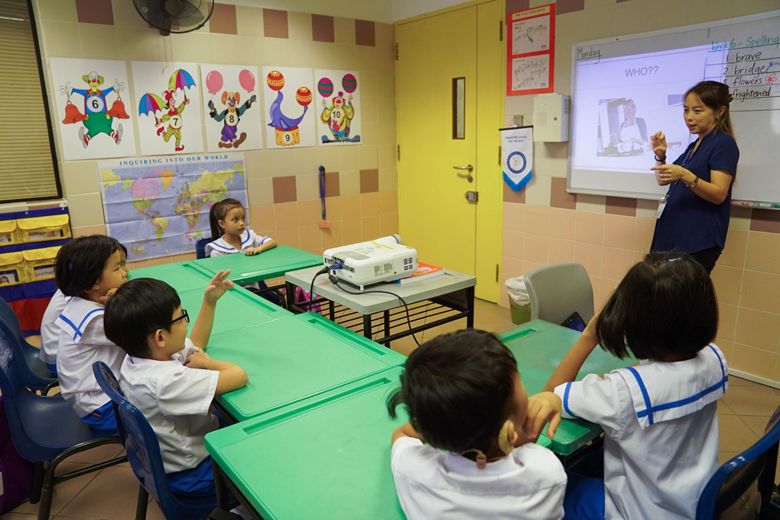Parliament: MOE committed to special needs education but workplaces should also be inclusive, says Indranee
Sign up now: Get tips on how to help your child succeed

Mrs Janice Lim, one of the two specialised teachers at Mayflower Primary School, teaching sign language to a group of six children with hearing loss. Mayflower Primary uses sign language as the medium of teaching for pupils with hearing loss.
PHOTO: ST FILE
SINGAPORE - Schools here are already committed to ensuring that children with special needs get a full education but the government can only do so much, said Second Minister for Education Indranee Rajah on Monday (March 4). Society and employers also need to be inclusive, she explained.
She was responding to questions from four MPs about the quality and accessibility of resources in mainstream schools and higher learning institutes for students with special educational needs.
Non-Constituency MP Daniel Goh, from the Workers' Party, said: "It seems that special educational needs support has improved tremendously in primary and secondary schools, but there is a big jump when graduates go on to tertiary educational institutes and are treated as fully independent adults."
Ms Indranee said: "As our education system develops to cater to a wider spectrum of students, the support and resources we provide have been improving in tandem."
She cited examples of teaching tools and assistive learning devices that have been introduced in mainstream schools to support such students.
These include Frequency Modulation equipment, Braille notebooks, computer systems with specialised features, talking calculators, voice synthesizers and customised furniture.
"More importantly, we have a strong network of support to guide students with special educational needs in their educational journey, from enrolment to graduation," Ms Indranee added.
She noted that over the past five years, the number of allied educators for learning and behavioural support in mainstream schools has increased by over 40 per cent. There is also a core group of teachers in primary and secondary schools who have been trained to support students with special educational needs.
Ms Denise Phua (Jalan Besar GRC) asked about lifelong learning pathways for these students and the help they get when entering the workforce.
"Many students with special educational needs need to be schooled in literacy and numeracy or the mainstream academics," said Ms Phua.
"But they also need time throughout life to learn a host of skills that are often picked up more naturally by their typical peers - skills such as self-management, home and community living, sexuality and skills on how to navigate in a (volatile, uncertain, complex and ambiguous) world that is rapidly changing."
Ms Indranee replied: "To prepare them for transition into the workforce, the institutes of higher learning work on building up their confidence and independence while still in school. This helps them develop strong coping and management skills for life and take charge of their own learning needs."
Education and career guidance counsellors and teachers also work with these students to help them identify their strengths and find work-related opportunities that interest and suit them.
Ms Indranee cited the example of Rachael Lum, a former student from Cerebral Palsy Alliance Singapore School who is hemiplegic and thus has weaker functions on the right side of her body.
Rachael started her community-based work experience while at school by partnering potential employers for month-long work attachments.
One of her employers, Foreword Coffee, provided visuals and labels to help her remember the steps to take for certain tasks and gave her an electric whisk to stir drinks to accommodate her reduced motor skills.
She later completed a further six-month internship with Foreword Coffee and having graduated, the 19-year-old now works there as a part-time service crew member.
Ms Indranee said: "I would like to encourage employers to be open to employing persons with special needs, and to design workplaces and processes to accommodate them.
"Workplace colleagues also have a role to play in creating an environment that is welcoming and supportive of persons with special needs.
"Most importantly, I would encourage all to look beyond disabilities and think more in terms of what their strengths and talents are.
"See them as people who - just like everyone else - have hopes, dreams and aspirations. We should accept them as they are... Only then can we be truly inclusive."


